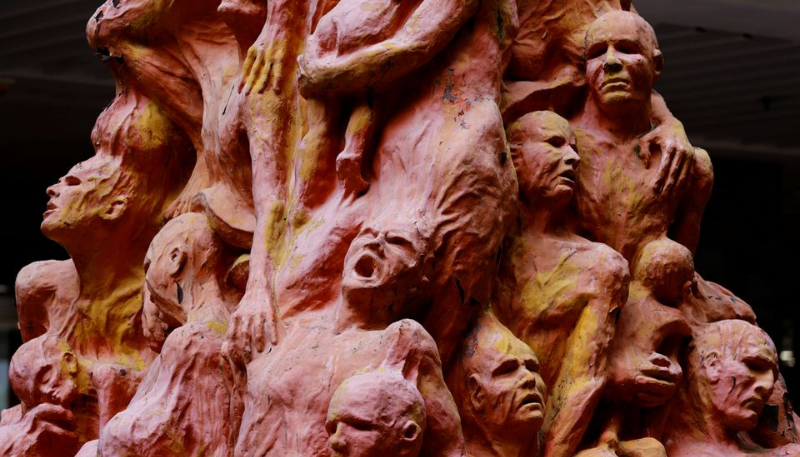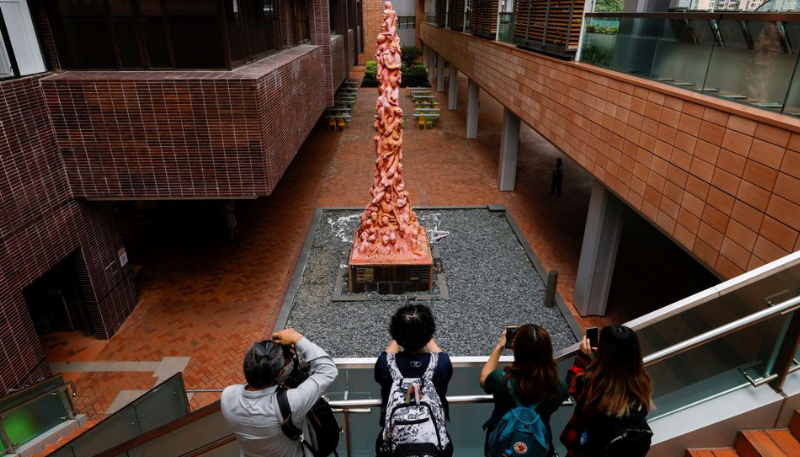Home ›› 24 Dec 2021 ›› World Biz

Two Hong Kong universities on Friday removed sculptures marking Beijing's 1989 crackdown on Tiananmen Square democracy protesters, as authorities steadily erase all remaining traces of the deadly event from the southern Chinese territory.
The removals come a day after Hong Kong's oldest university took down a statue commemorating the bloody crackdown, sparking outcry by activists and dissident artists in the city and abroad.
Hong Kong was for a long time the only place in China where mass remembrance of Tiananmen was tolerated, with thousands gathering each year to mourn democracy protesters killed by Chinese troops.
The city's university campuses marked the crackdown with statues commemorating the events in a vivid illustration of the freedoms the semi-autonomous territory enjoyed.
But early Friday, the Chinese University of Hong Kong (CUHK) removed the "Goddess of Democracy" from its campus.
The sculpture by Chen Weiming -- a six-metre (21-foot) replica of the giant statue that students erected in Tiananmen Square -- was a potent symbol of Hong Kong's democracy movement.
Around the same time, the Lingnan University of Hong Kong removed another relief sculpture marking the Tiananmen crackdown, also created by Chen and painted over a wall bearing an image of the Goddess of Democracy.
The removals took place on Christmas Eve when many students were on break and away from campus.
The US-based artist Chen expressed "regret and anger" at the removal of his works, adding that the universities behaved "illegally and unreasonably".
"They acted like a thief in the night", Chen told AFP. "It was the opposite of being clean and above board... They were afraid of exposure and of a backlash from students and alumni."
Chen said the works were only on loan to the schools and that he would hire a lawyer to take legal action if the sculptures were damaged.

CUHK said it removed the "unauthorised statue" after an internal assessment, adding that the groups responsible for moving it to the campus in 2010 were no longer functional.
Lingnan University said it had taken down its statue after having "reviewed and assessed items on campus that may pose legal and safety risks to the university community."
Students cry shame
On Friday afternoon, flyers with the Chinese character for "shame" were spotted in Lingnan University where the relief used to be, as well as at other locations on campus.
Two young women told AFP they were Lingnan alumni responsible for putting up the flyers, saying that they were angered by the school's move.
"They are erasing history... I don't want to be forced to forget," said a woman surnamed Tsang, who said she was from mainland China.
Georgetown Law School scholar Eric Lai said the removal of CUHK's Goddess of Democracy statue reflected a "further kowtowing of local (university) authorities to the national security regime."
Lai was the president of CUHK's student union when the statue was moved to the campus in 2010.
"As my student union folks and I insisted, the New Goddess of Democracy was installed in CUHK campus with estimated 2,000 students and citizens witnessing, amid the school management's rejection," Lai tweeted, adding that the statue became a landmark of student protest events.
CUHK's student union, known for its active role in Hong Kong's democracy movement spanning 50 years, disbanded in October.
Meanwhile, the statues' removal was celebrated by some of the 90 politicians elected to Hong Kong's legislature on Sunday under Beijing-imposed "patriots only" rules.

"There were many political hacks who manipulated populist sentiments and incited hatred using the banner of democracy and freedom. Today, Hong Kongers can finally breathe easy and return to normal life," wrote Horace Cheung, vice-chair of Hong Kong's largest pro-China party DAB.
Beijing is remoulding Hong Kong in its own image after democracy protests two years ago and commemorating Tiananmen has effectively been criminalised.
An annual candlelight vigil to mark the June 4 crackdown has been banned for the past two years, with authorities citing security and pandemic fears.
In September, police raided a museum commemorating Tiananmen and seized exhibits, under a sweeping national security law that Beijing imposed on Hong Kong last year to curb dissent after huge and often violent democracy protests.
The museum had previously been shuttered as authorities said it lacked the relevant licence.